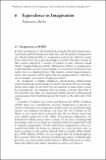Files in this item
Equivalence in imagination
Item metadata
| dc.contributor.author | Berto, Franz | |
| dc.contributor.editor | Badura, Christopher | |
| dc.contributor.editor | Kind, Amy | |
| dc.date.accessioned | 2022-07-06T16:30:05Z | |
| dc.date.available | 2022-07-06T16:30:05Z | |
| dc.date.issued | 2021-06-14 | |
| dc.identifier | 271472282 | |
| dc.identifier | 5732217d-bf6e-41ff-9746-91942838de7f | |
| dc.identifier | 85109031666 | |
| dc.identifier | 000783264100007 | |
| dc.identifier.citation | Berto , F 2021 , Equivalence in imagination . in C Badura & A Kind (eds) , Epistemic uses of imagination . Routledge studies in contemporary philosophy , Routledge Taylor & Francis Group , Abingdon, Oxon . https://doi.org/10.4324/9781003041979-9 | en |
| dc.identifier.isbn | 9780367480561 | |
| dc.identifier.isbn | 9781032018935 | |
| dc.identifier.isbn | 9781003041979 | |
| dc.identifier.other | ORCID: /0000-0003-3246-657X/work/97129975 | |
| dc.identifier.uri | https://hdl.handle.net/10023/25614 | |
| dc.description | Funding: This research is published within the Project ‘The Logic of Conceivability’, Funded by the European Research Council (ERC CoG), Grant Number 681404. | en |
| dc.description.abstract | One sense of ‘imagination’ that matters in epistemology has the word mean ‘reality-oriented mental simulation’ (ROMS): we suppose that something is the case, develop the supposition by importing background knowledge and beliefs, and check what is true in the imagined scenario. What is the logic of ROMS? Imagination has a reputation for being logically anarchic. In particular, it’s hyperintensional: we can imagine A without imagining a necessarily equivalent B. This work considers a Principle of Equivalence in Imagination which, if accepted, will limit the anarchy: when A and B are equivalent in imagination, one will imagine the same things after supposing either in ROMS. What is equivalence in imagination? It is suggested that it’s cognitive equivalence. A and B are cognitively equivalent for one when they play the same role in one’s cognitive life: whatever one understands, concludes, etc., given either, one does, given the other. ROMS is logically modelled via variably strict modals. Two formal semantics are proposed for them: one uses possible worlds plus an algebra of topics; the other resorts to impossible worlds. The two deal with equivalence in imagination in subtly different ways. | |
| dc.format.extent | 19 | |
| dc.format.extent | 250209 | |
| dc.language.iso | eng | |
| dc.publisher | Routledge Taylor & Francis Group | |
| dc.relation.ispartof | Epistemic uses of imagination | en |
| dc.relation.ispartofseries | Routledge studies in contemporary philosophy | en |
| dc.subject | BC Logic | en |
| dc.subject | MCC | en |
| dc.subject.lcc | BC | en |
| dc.title | Equivalence in imagination | en |
| dc.type | Book item | en |
| dc.contributor.sponsor | European Research Council | en |
| dc.contributor.institution | University of St Andrews. Philosophy | en |
| dc.identifier.doi | 10.4324/9781003041979-9 | |
| dc.identifier.url | https://doi.org/10.4324/9781003041979 | en |
| dc.identifier.url | https://discover.libraryhub.jisc.ac.uk/search?isn=9780367480561&rn=1 | en |
| dc.identifier.grantnumber | 681404 | en |
This item appears in the following Collection(s)
Items in the St Andrews Research Repository are protected by copyright, with all rights reserved, unless otherwise indicated.

